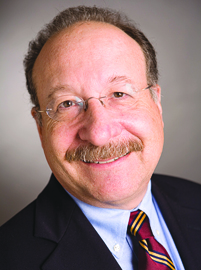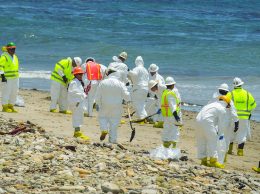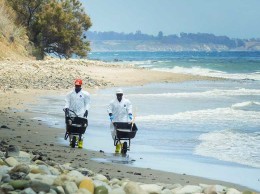Dubroff: In era of unusual calamities, Feinberg has faith in system
IN THIS ARTICLE
- Columns Topic
- Henry Dubroff Author
By Henry Dubroff Friday, March 11th, 2016

Editor Henry Dubroff
Kenneth R. Feinberg has had an up-close-and-personal view of human tragedy.
As the nation’s premier attorney for dealing with disasters, both natural and man-made, he has a remarkably practical approach to what should happen when things go wrong.
So, when I had the chance to talk to him on March 8, I couldn’t resist asking him how he thinks the Refugio Oil Spill will play out for victims along the Central Coast and beyond.
In his view, a number of the claims resulting from the spill of 143,000 gallons of oil in May 2015 will be settled directly with Plains All American Pipeline, which so far has shelled out millions to local merchants and businesses whose operations were interrupted.
Some claimants, including those represented by attorney Barry Cappello and other class-action firms, might just be headed to court. And the biggest claims, those of ExxonMobil and Venoco whose oil production has been cut off for nearly a year thanks to pipeline safety concerns, will be negotiated behind closed doors with attorneys for both sides plus their insurance companies digging in for a long fight.
Feinberg came to prominence in the wake of the Sept. 11, 2001 attacks when President George W. Bush asked the former chief of staff to Sen. Edward M. Kennedy to oversee a special fund set up on behalf of the victims.
Since then he has been called on to work on the BP oil spill fund by President Barack Obama, by GM to oversee compensation to victims for ignition switch failures and more recently by Volkswagen to oversee resolution of its diesel engine test-rigging recall. In a settlement that resonates across this year’s election campaign, he famously slashed bonus payments to Wall Street executives as the Obama Administration’s pay czar overseeing federal bailout money.
He’ll bring his unique perspective to a March 16 lecture at Santa Barbara’s New Vic theatre at 33 W. Victoria St. as part of this year’s UCSB Arts & Lectures series. His talk is aptly titled “Unconventional Responses to Unique Catastrophes: Tailoring the Law to Meet the Challenges.”
In one of the more dramatic moments of a distinguished career, Feinberg recalls meeting with one of the 9/11 victims, the wife of a deceased New York firefighter who said she needed to be paid out a $2.5 million settlement in a matter of weeks. The reason, she said, was that she had terminal cancer and needed to set up a trust to take care of two young children. “My husband was going to survive me,” she said, “now my children are going to be orphans.”
He said his team raced to the Department of the Treasury to get the money and she died eight weeks later.
Feinberg said that although his role is unique, he’s not setting out to change the legal system. “The programs I administer are exceedingly rare,” he said, adding “they don’t pose a threat to the way we resolve claims, a way that has served the American people quite well. ”
He said his role works best when there are circumstances that cause major participants to “think outside the box” but that in general it risks putting too much power into one person’s hands, for better and for worse. Feinberg said that public criticism goes with the territory and that the ultimate decisions “are not rocket science.”
Although the structure of a prospective VW settlement is still under discussion, he said the parameters are complex. For one thing, any settlement will have to satisfy both the federal Environmental Protection Agency and the California Air Resources Board. For another, there are huge practical concerns about what do with affected vehicles. “I don’t advise delivering a massive number of cars to the dealer all on the same day. There has to be an orderly effort to repair or replace them,” he said.
In the end, he said, it’s memories like that of the widowed firefighter that leave the lasting impression. “The problem is not designing programs,” he said. “It’s working with individual victims that’s the toughest part.”
• Reach Editor Henry Dubroff at [email protected].












